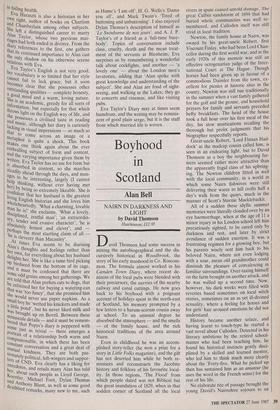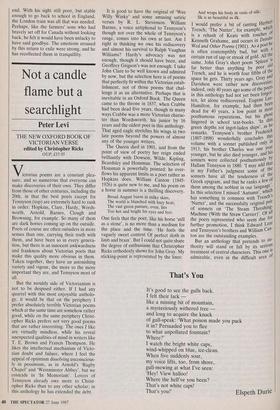Boyhood in Scotland
Alan Bell
NAIRN IN DARKNESS AND LIGHT by David Thomson Hutchinson, £12.95 David Thomson had some success in mixing the autobiographical and the dis- cursively historical in Woodbrook, the story of his early manhood in Co. Roscom- mon. The formula almost worked in his Camden Town Diary, where recent de- nizens of the local pubs were blended with their precursors, the navvies of the nearby railway and canal cuttings. He now goes back to his boyhood with a poignant account of holidays spent in the north-east of Scotland, his memory prompted by a few letters to a harum-scarum cousin away at school. To an unusual degree he absorbed the atmosphere — and the smells — of the family house, and the rich historical traditions of the area around Nairn.
Even in childhood he was an accom- plished story-teller (he won a prize for a story in Little Folks magazine), and the gift has not deserted him while he both re- minisces and reconstructs the Jacobite history and folklore of his favourite local- ity. In those regions, 'The Flood' from which people dated was not Biblical but the great inundation of 1829, when in that sodden corner of Scotland all the local
rivers in spate caused untold damage. The great Culbin sandstorm of 1694 that had buried whole communities was well re- membered, and Culloden itself was still vivid in local tradition.
Newton, the family house at Nairn, was owned by his great-uncle Robert, first Viscount Finlay, who had been Lord Chan- cellor during the first world war, and in the early 1920s of this memoir was still an effective octogenarian judge of the Inter- national Court at The Hague. Though horses had been given up in favour of a commodious Daimler from the town, ex- cellent for picnics at historic sites in the county, Newton was still run traditionally in the summer when a vast family gathered for the golf and the grouse, and household prayers for family and servants preceded hefty breakfasts. The head of the house took a full hour over his first meal of the day, his slow mastications recalling the thorough but prolix judgments that his biographer respectfully reports. Great-uncle Robert, 'Lord Finnan Had- dock' as the madcap cousin called him, is seen in an endearing light, but to David Thomson as a boy the neighbouring far- mers seemed rather more attractive than the apparently frigid class of his upbring- ing. The Newton children fitted in well with the local community, in a world in which some Nairn fishwives were still delivering their wares to hill crofts half a day's walk from the quays, much in the manner of Scott's Steenie Mucklebackit.
All of a sudden these idyllic summer memories were literally clouded over by an eye haemorrhage, when at the age of 11 a minor injury in his London school left him precariously sighted, to be cured only by darkness and rest, and later by strict avoidance of sudden exertion. It was a frustrating regimen for a growing boy, but his parents wisely sent him back to his beloved Nairn, where not even lodging with a sour, mean old grandmother could diminish the pleasure of convalescing in familiar surroundings. Over-taxing himself on the farm brought on another attack, and he was walled up a second time. Now, however, his dark weeks were filled with reveries based sometimes on local witch stories, sometimes on an as yet ill-divined sexuality, where a feeling for horses and for girls' hair aroused emotions he did not understand.
History became another solace, and having learnt to touch-type he started a vast novel about Culloden. Detected in his literary ambitions by the retired school- master who had been teaching him, he found his historical instincts gently disci- plined by a skilled and learned mentor, who led him to think much more clearly about the 'Forty-five. What he picked up then has sustained him as an amateur (he uses the word in the French sense) for the rest of his life.
No elaborate rite of passage brought the young David's Nairnshire sojourn to an end. With his sight still poor, but stable enough to go back to school in England, the London train was all that was needed. Perhaps, like the farmers' sons who had bravely set off for Canada without looking back, he felt it would have been unlucky to have said goodbye. The emotions aroused by this return to exile were strong, and he has recollected them in tranquillity.










































































 Previous page
Previous page